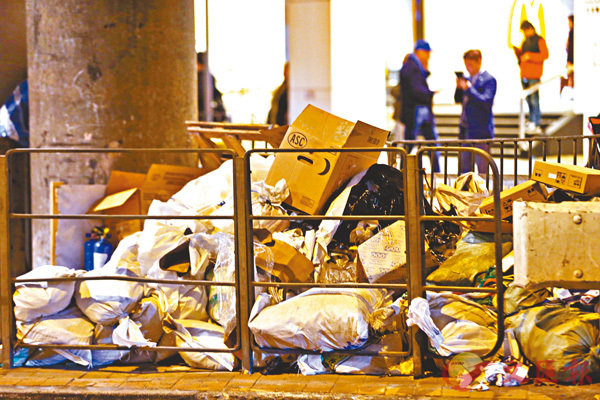 ■香港在2016年的人均垃圾棄置量較倫敦、首爾等大城市為高。 資料圖片
■香港在2016年的人均垃圾棄置量較倫敦、首爾等大城市為高。 資料圖片【原文】環境局將於本月向立法會提交《都市固體廢物收費條例草案》,草案規定市民必須購買政府指定垃圾袋棄置家居廢物,最快2020年底實施。垃圾徵費在歐洲國家十分普遍,在亞洲例如台灣地區、韓國等亦實施多年,的確有助於落實污者自付和源頭減廢,值得支持。唯當局必須將執行細節思考得更細緻,讓實施程序更合理、監管處罰更適切,並做好宣傳教育,確保政策順利落實。垃圾徵費只是第一步,下一步本港要盡快推進垃圾分類、處理以至循環再用等系統工程,讓香港在環保減廢上追上國際先進水平。
俗稱垃圾徵費的都市固體廢物收費,在本港已討論多年並一再拖延,原訂明年年底落實,現計劃本月14日向立法會遞交條例草案進行首讀及二讀,最快2020年落實,較原先計劃延遲一年。垃圾徵費的用意是落實污者自付,通過經濟手段促使大家減少產生垃圾,達到源頭減廢的目的。環顧亞洲其他地區,韓國早於1995年實施垃圾徵費,新加坡於1996年、台灣地區於2000年亦分別實施,香港作為區內國際都會,今天才實施已是太遲。
環境局草案提出循專用垃圾袋收費,每公升垃圾收費0.11港元,這個收費標準參考了韓國和台灣地區,水平不高,對一般家庭不會構成大的負擔。當局估算一般三人家庭每月垃圾費約33元至51元。值得指出的是,這項費用並非代表一個三人家庭會因垃圾徵費而多付出,因為現時大家無論是購買垃圾袋,還是用超市購物膠袋裝垃圾,本身都並不是免費的。一來一回,垃圾徵費政策預料只會令一個三人家庭每月增加十來二十元的負擔而已。加上當局計劃對綜援受助人每月提供10元津貼,已充分考慮低下階層的需要,在執行上不至於有很大阻力。
即使如此,由於涉及全港家家戶戶,當局仍然需要在未來兩年做足準備功夫。既要教育先行,做好宣傳工作;亦要充分利用社區組織的支援落實前期鋪排;同時要適當增加人手,應付執行初期可能帶來的新增工作量。例如落實專用垃圾袋之後,垃圾站的工作人員要負責分辨不合格的垃圾袋,這無疑會增加工作量,擬定執行細則的官員必須與前線工作人員充分溝通,將程序設計考慮得周到細緻。當局亦需在落實初期增加人手巡查,作出警告勸喻,直至落實1,500元的定額罰款政策。
香港在2016年的人均垃圾棄置量達每日1.41公斤,較倫敦、首爾等大城市為高,既與香港國際都會的地位不相稱,亦有違港人重視環保的態度。無論是現有設施還是市民素質,香港都有充分條件實施垃圾徵費,不應再拖。與此同時,必須強調垃圾徵費只是第一步,香港仍需進一步做好垃圾分類尤其是家居廚餘分類,以垃圾焚燒發電取代堆填,做好有用垃圾的循環再用等等。在這些方面,香港仍有很長的路要走。 (標題為編輯所加) (摘錄自香港文匯報社評 1-11-2018)
Municipal solid waste charges is the first step of environmental protection
【譯文】The Environment Bureau is set to introduce a bill for the proposed mandatory waste charging scheme this month. Launching in 2020 at the earliest, the scheme would make it mandatory for households to dispose of their domestic waste using pre-paid designated garbage bags.
Waste disposal levies are very common among European countries. In Asia, Taiwan and South Korea have also enforced such rules for years. Considering its proven track record in putting the "polluter-pays" and "waste reduction at source" principles into practice, the waste charge proposal is well worth supporting.
However, the government must plan ahead meticulously, so that the implementation process of the charging scheme could be more reasonable, and its regulatory regime more appropriate. To ensure a smooth implementation, the authorities should also step up their efforts in educating the public and publicising the scheme. The introduction of waste disposal levy is only the first step - If Hong Kong were to catch up with the pioneers on the international stage in terms of environmental protection and waste reduction, waste sorting and recycling must be further promoted.
Municipal solid waste(MSW) charges, also commonly known as "garbage levies", have been put on the table for discussion and dragged on for years. Original plans were to have it implemented by the end of next year. Now it is delayed by one year to 2020 at the earliest, as the latest plan will have the bill introduced into the Legislative Council for first and second readings on November 14. The purpose of waste charging is to put in place the "polluter-pays" principle, and to promote waste reduction through economic means, thus achieving reduction at source.
Taking a quick look at Hong Kong's neighbours in Asia, South Korea, Singapore and Taiwan have implemented waste charging as early as in 1995, 1996 and 2000 respectively. As a world city in the region, Hong Kong is lagging too far behind.
In its draft bill, the Environment Bureau has proposed to set the per-litre charge for designated garbage bags at an affordable HK$0.11 after drawing experience from South Korea and Taiwan. At this level, the charges should not impose any significant financial strain to the average household in Hong Kong.
According to official estimations, the new charging scheme would cost a three-person household around HK$33 to HK$51 per month. It is worth noting however, that this estimated waste charge does not represent an extra monthly cost for the average three-person household.
It is because the waste bags that we are now using - be it the usual garbage bags or the plastic shopping bags that we purchased from supermarkets - are not free of charge. Subtracting that from the new waste charges, the average three-person household only needs to pay HK$10 to HK$20 extra each month. Given that the authorities are also going to provide a HK$10 per month subsidy to recipients of the Comprehensive Social Security Assistance (CSSA), the needs of the grassroots have been carefully considered. Implementation of the proposed charging scheme should be met with little resistance.
Even so, the authorities would still need to be well-prepared in the next two years from a public interest perspective. First, the government should step up its efforts in educating the public and publicising the scheme. Second, relevant authorities should cooperate with community organisations and harness their support when conducting preliminary preparations of the scheme. Third, manpower should be increased to cope with the extra workload at the early stages of the charging scheme's implementation.
For instance, frontline workers in public refuse collection points would have shoulder extra responsibility by taking enforcement action and rejecting non-compliant refuse. Government officials responsible for drawing up guidelines must communicate amply with frontline workers in order to refine the workflow.
The authorities should also arrange for additional enforcement staff during the early phases, and issue warnings to offenders until the policy of HK$1,500 fixed penalty is implemented.
In 2016, Hong Kong's per capita disposal rate of MSW has reached 1.41kg per day. The fact that our disposal rate per capita is much higher than that of other major cities such as London and Seoul, is not only unbefitting of Hong Kong's status as an international city, but also in direct contrary to our citizens' environmentalist values. There is no reason to further delay waste charging in Hong Kong as we are more than ready both in terms of hardware and citizens' awareness. Meanwhile, one must stress that MSW charging is only the first step of many.
In the future, Hong Kong must also consolidate its efforts in MSW sorting (especially food waste separation), substitute landfills with waste-to-energy (WtE) power plants, and increase the recycling rates of potentially useful materials. There is still a long way ahead of Hong Kong in achieving all the above goals.■Jeffrey Tse (ywc_jeffrey@hotmail.com)
Exercise
1. 都市固體廢物
2. 廢電器電子產品生產者責任計劃
3. 轉廢為能
4. 污者自付原則
5. 條例草案
Answer
1. municipal solid waste
2. the Producer Responsibility Scheme on waste electrical and electronic equipment
3. waste-to-energy
4. the polluter-pays principle
5. bill

